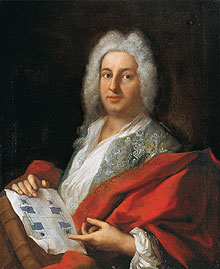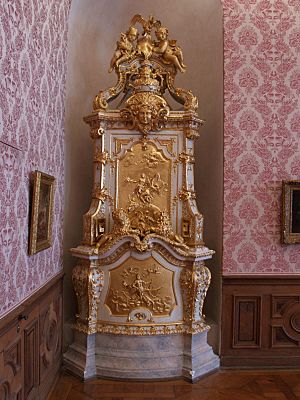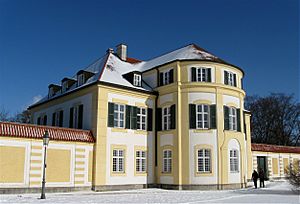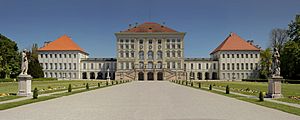Joseph Effner facts for kids
Joseph Effner (born February 4, 1687 – died February 23, 1745) was a talented German architect and decorator. He is known for bringing new French architectural styles to Germany. He designed many beautiful buildings and palaces.
Contents
Life and Career of Joseph Effner
Joseph Effner was born in a town called Dachau in Bavaria. His father, Christian Öffner, worked as a gardener for the royal court. Joseph Effner traveled with Max Emanuel, who was the ruler of Bavaria.
In 1706, Effner went to Paris, France. There, he studied architecture with a famous French architect named Gabriel Germain Boffrand. During this time, he changed his family name to "Effner."
The ruler of Bavaria sent Effner on a study trip to Italy in 1717. From 1715 to 1726, Effner worked as the main architect for the Bavarian court. He brought fresh, modern French ideas about building design to the city of Munich.
After another architect, Enrico Zuccalli, passed away in 1724, Effner took on even more important roles. However, when Charles Albert became the new ruler in 1726, Effner was replaced by his own student, François de Cuvilliés. After this, Effner worked in government administration. He passed away in Munich.
Effner's Architectural Training
Effner learned his skills from the well-known French architect Germain Boffrand. Boffrand's teaching greatly influenced Effner's building style. This training helped Effner introduce new French designs when he returned to Germany with the Elector.
Key Architectural Designs
As the chief architect for the court, Effner worked on the ruler's homes in Munich. He made many changes and improvements to these grand buildings. His work on the Nymphenburg Palace is considered his best. He made the palace much larger. He also added three smaller buildings, an interesting octagonal Chinese pagoda, a ruined hermit's cell, and a fancy tiled bathhouse.
Notable Works by Joseph Effner
Here are some of Joseph Effner's most important projects:
- Improving the Dachau Palace (1715–1717)
- Designing the Fürstenried Palace in Munich (1715–1717)
- Expanding the park and palace of Nymphenburg. He also built the Pagodenburg (1716–1719) and the Badenburg (1718–1721) there.
- Enlarging the Schleissheim Palace (1719–1726)
- Building the Reiche Zimmer (Rich Rooms) inside the Munich Residence
- Constructing the Palais Preysing in Munich (1723–1729)
See also
 In Spanish: Joseph Effner para niños
In Spanish: Joseph Effner para niños
 | Anna J. Cooper |
 | Mary McLeod Bethune |
 | Lillie Mae Bradford |





